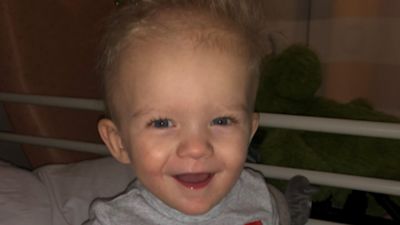Heartbroken parents who lost toddler to rare brain tumour determined to raise awareness of condition

Albie's parents spoke to ITV News Meridian's Charlotte Briere-Edney about their loss
A grieving couple from Oxfordshire who lost their two-year-old son to a rare brain tumour have told ITV News Meridian there's no greater pain than knowing your child is about to be taken.
Toddler Albie Bayliss-Watts was diagnosed with an aggressive brain tumour in December 2020, after his parents took him to the John Radcliffe Hospital in Oxford because he was being 'violently sick'.
After undergoing intensive chemotherapy, Albie died 11 months later in November 2021.
Albie's parents Hayley and Lauren Bayliss-Watts are now aiming to raise awareness and support research into brain tumours, in the hope that no other family will suffer like them.
Lauren said, "Albie suffered a seizure out of the blue in October 2020 and we took him to hospital but they didn't give him a CT scan.
"They thought it was a type of epilepsy and referred him to neurology. But six weeks later, just before Albie was due to see a consultant, he started being sick.
"We thought it was a bug at first then he began vomiting blood and we became really worried."
An MRI scan revealed a mass the size of a tennis ball on Albie's brain. It was causing so much pressure that within hours, he was undergoing emergency surgery.
After more chemotherapy throughout 2021, Albie returned home in August, but his parents were given the devastating news in October that the cancer had spread.
"We were racking our brains for something we might have missed. I think every parent would be doing that and questioning that.
"Still now to this day, we keep saying we want to wake up and this is a nightmare. This isn't happening to us. You read about these sort of things, and you see this in newspapers and magazines, but that would never happen to me.
"It was a horrendous year of ups and downs. He became so sick with the chemotherapy, he had one of the harshest chemotherapies you can have. And he would have days where he could eat and drink, but then other days where he couldn't and he would be so sad about it.
"It was just heartbreaking.
"He just started vomiting one morning and we just knew.
"It was the same vomiting he had when we thought it was just a sick bug the year before. So we knew what it meant, we knew he was ill and we just rushed back to hospital.
"He'd been running around the beach happily the day before, then we find out he's got three new spots of disease the next day. How does that even happen?
What are the symptoms of a brain tumour?
Headaches
Headaches
Headaches are one of the most common symptoms of a brain tumour.
Be severe and persistent
Often worse in the morning
Get worse over a number of days
Give stabbing pains if you do anything that increases the pressure in your head, for example coughing, shouting, bending over or doing exercise.
Eye problems
Eye problems
The following symptoms can be caused by a variety of conditions, but it's always worth checking with your GP.
Squinting
Worsening vision
Blurred or double vision
Restricted field of vision, loss of peripheral vision, blind spots
Problems with looking upwards or controlling eye movements
Abnormal eye movements such as flickering eyes
Head tilt, usually because the patient is turning to see things out of the corner of their eye rather than looking straight at them
Brief loss, blurring or “greying out” of vision, sometimes triggered by coughing, sneezing or bending down
As the tumour grows, it may cause the eyeball to bulge forwards. This is known as proptosis.
Other common symptoms
Other common symptoms
Continuing nausea, vomiting
Extreme or sudden drowsiness
Tinnitus (ringing in the ears) or hearing loss
Unexplained twitches of the face or limbs
Seizures (fits or faints)
Appearing to be lost in a deep daydream for a short while
Confusion
Loss of balance
Numbness or weakness in the arms or legs, especially if progressive and leading to paralysis
Numbness or weakness in a part of the face, so that the muscles drop slightly
Numbness or weakness on one side of the body, resulting in stumbling or lack of co-ordination
Changes in personality or behaviour
Impaired memory or mental ability, which may be very subtle to begin with
Changes in senses, including smell
Problems with speech, writing or drawing
Loss of concentration or difficulty in concentrating
Changes in sleep patterns
Lauren & Hayley Bayliss-Watts
Lauren continued, "He was such a resilient child that you never knew was poorly, he masked everything so well.
"Even in the really awful times, he always had a smile for someone and would do things to try and cheer us up.
"He was always cheeky, and always smiley from when he was born.
"From the moment we met him we were besotted by him."
Brain tumours are the biggest cancer killer of children and adults under 40.
Hugh Adams, Brain Tumour Research
Hugh Adams, Brain Tumour Research said, "Although Albie had a rare tumour, we hear too many stories of tragedy that falls upon families.
"What's really important is that we underpin funding for scientific research into brain tumours.
"We need to understand what's going on in that disease area, and that means more money from Government, more money from charities and more people raising awareness like Albie's family."